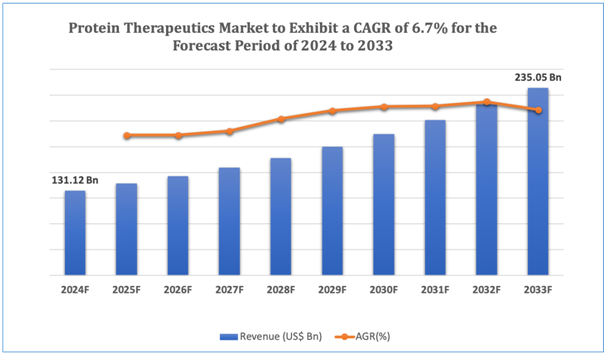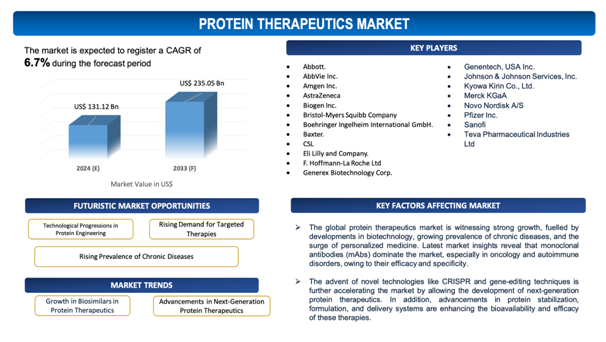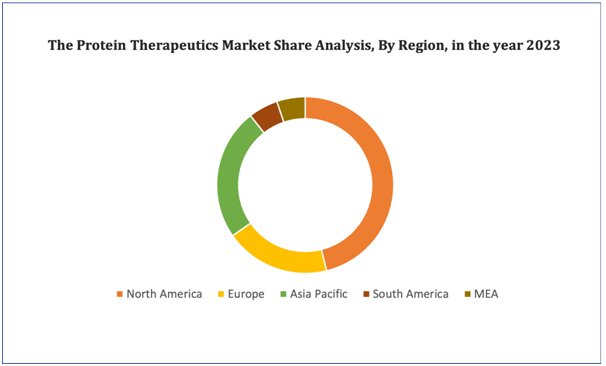Protein TherapeuticsMarket Overview
The global protein therapeutics market is estimated to be worth over USD 235.05Bn in 2033 and is expected to grow at CAGR of 6.7% during the forecast period (2024-2033).
Protein therapeutics are transformingadvanced medicine by providing a highly targeted approach to treating a broadrange of diseases. Unlike conventional small molecule drugs, which often have broad effects and potential side effects, protein-based therapies are designed to act precisely on specific biological targets, leading to enhanced safetyand efficacy. These therapeutics comprise monoclonal antibodies (mAbs), therapeutic enzymes, and peptides, all of which holdcritical roles in the treatment of conditions such as autoimmune disorders, cancer, and genetic diseases.
Monoclonal antibodies, for instance, have revolutionized cancer treatment by selectively targeting cancer cells while diminishing damage to healthy tissues. This precision mitigates side effects and improves treatment outcomes. In autoimmune diseases like rheumatoid arthritis, biologic drugs, including mAbs, target specific immune system components to minimize inflammation and disease progression. In a similar manner, enzyme replacement therapies are becoming crucial for treating metabolic disorders by compensating for missing or defective enzymes in patients with rare genetic conditions.
The surge of recombinant DNA technology has further accelerated the development of protein therapeutics, enabling for the production of more complex and tailored proteins that can address unmet medical needs. With innovations in bioengineering, these therapies are becoming more potent,stable, and effective in treating chronic and life-threatening conditions.
Protein therapeutics are also a leading player in the transition toward personalized medicine, where treatments are designed to match an individual’s unique genetic makeup. This personalization enhances the likelihood of treatment success while reducing adverse reactions. As the field of protein therapeutics continues to evolve, it is not only improving patient outcomes but also revolutionizing the healthcare landscape, offering hope for more effective and safer treatments for previously hard-to-treat diseases.
Figure 1. Protein Therapeutics: Market Size

Get more details on this report - Request Free Sample
Key Market Insights
The global protein therapeutics market is witnessingstrong growth, fuelled by developments in biotechnology, growing prevalence of chronic diseases, and the surge of personalized medicine. Latest market insights reveal that monoclonal antibodies (mAbs) dominate the market, especially in oncology and autoimmune disorders, owing to their efficacyand specificity. Other therapeutic proteins, comprising enzymes, insulin, and growth factors, are also contributing to market expansion by addressing diverse medical needs. Recent developments in recombinant DNA technology and bioengineering are allowing the creation of more potent, stable, and tailored protein-based drugs. Advancements such as antibody-drug conjugates (ADCs) and bispecific antibodies are gaining momentum, offering more precise therapeutic mechanisms by combining targeted protein binding with drug delivery capabilities.
The advent of novel technologies like CRISPR and gene-editing techniques is further accelerating the market by allowing the development of next-generation protein therapeutics. In addition, advancements in protein stabilization, formulation, and delivery systems are enhancing the bioavailability and efficacy of these therapies. The market is seeing higher investment in research and development, with biopharmaceutical companies emphasizing on expanding their protein therapeutic portfolios to address unmet medical needs in areas like rare diseases and immunotherapy.
Geographically, North America dominates the global market attributing to the presence of major pharmaceutical players and strong healthcare infrastructure, while emerging markets in Asia-Pacific are experiencing significant growth, driven by increasing healthcare expenditure and biotechnology advancements. This dynamic market stands ready for sustained expansion as novel technologies and therapeutic approaches advance.
Market Dynamics
Market Drivers
Technological Progressions in Protein Engineering
Technological advancements in protein engineering is a primary driver of growth in the global protein therapeutics market. These innovations allow the design and development of more effective, stable, and personalized protein-based drugs, addressing limitations of earlier therapies. Protein engineering enables scientists to amend the structure and function of proteins, improving their stability, specificity, and efficacy in treating complex diseases. For example, progresses in recombinant DNA technology and synthetic biology allow the creation of engineered proteins with enhanced pharmacokinetics, such as longer half-lives, minimizing the frequency of administration for patients.
In addition, protein engineering has supported the development of next-generation therapeutic proteins like bispecific antibodies and antibody-drug conjugates (ADCs), which offer improved targeting and therapeutic potential by combining protein-based targeting with drug delivery capabilities. These technologies are proving transformative in oncology, autoimmune diseases, and rare genetic disorders, where precise targeting and minimized side effects are critical.
The application of computational modeling and artificial intelligence (AI) in protein design has further propelled the discovery and optimization of novel protein therapeutics. AI-driven platforms can predict protein interactions, folding, and stability, enhancing the efficacy of drug development. These progressions are not only expanding the therapeutic potential of proteins but also substantiallyminimizing the time and cost related to developing novel treatments.
As protein engineering continues to evolve, it is unlocking new possibilities in personalized medicine, fuelling demand for innovative treatments, and propelling the overall growth of the global protein therapeutics market.
Market Restraints
With regard to numerous advantages of protein therapeutics, the market faces several challenges due to the unique characteristics and requirements associated with these potent pharmaceutical products. Some of the key market challenges include:
- High Production Costs and Complex Manufacturing Processes: The production of protein therapeutics includes sophisticated technologies such as recombinant DNA technology, cell cultures, and bioengineering, all of which need specialized facilities and expertise. This leads to high manufacturing costs, which can deter the scalability of production and increase the price of therapies, making them less accessible in certain regions and markets.
- Stringent Regulatory Requirements and Approval Delays: Protein therapeutics, due to their complex structure and biological nature, face rigorous regulatory scrutiny to ensure safety and efficacy. The lengthy and costly approval processes by regulatory bodies like the FDA and EMA can delay the commercialization of new protein therapies. This can be a major barrier for smaller biotech firms, slowing down market growth.

Get more details on this report - Request Free Sample
Market Opportunity
Rising Demand of Targeted Therapies
The increasing demand for targeted therapies presents a significant market opportunity for the growth of the global protein therapeutics market. Targeted therapies, which emphasize on specific molecules or pathways involved in disease progression, offer a more precise and effective treatment approach compared to conventional therapies. Protein therapeutics, such as monoclonal antibodies, fusion proteins, and antibody-drug conjugates (ADCs), are inherently suited to fulfil this demand owing of their ability to selectively bind to target proteins or cells with high specificity. This precision not only improves treatment efficiency but also minimizes the risk of off-target effects and adverse reactions, making protein therapeutics particularly valuable in areas like autoimmune diseases, oncology, and rare genetic disorders.
The soaring understanding of molecular and genetic markers in diseases is further fuelling the need for targeted therapies, as personalized medicine continues to gain traction. This transition in medical treatment strategies is creating opportunities for pharmaceutical companies to develop new protein-based drugs that can address specific patient populations with customized treatments. In addition, as patients and healthcare providers prioritize efficacyand safety, protein therapeutics offer a competitive edge, contributing to their soaring demand.
With the global healthcare landscape progressively favoring precision medicine, the demand for targeted therapies is estimated to accelerate the expansion of the protein therapeutics market, spurring further research and development of advanced protein-based drugs that cater to this developing treatment paradigm.
Market Trends
- Growth of Biosimilars in Protein Therapeutics: As patents for several blockbuster protein-based drugs, especially monoclonal antibodies, expire, the market is witnessing a surge in the development and approval of biosimilars. These biologically similar alternatives offer cost-effective options for patients and healthcare systems while maintaining comparable safety and efficacy to original biologics. This trend is accelerating increased competition and expanding access to protein therapeutics, especially in emerging markets.
- Advancements in Next-Generation Protein Therapeutics: The development of next-generation protein therapeutics, such as bispecific antibodies, antibody-drug conjugates (ADCs), and fusion proteins, is gaining traction. These innovative therapies offer improved targeting and therapeutic outcomes by combining the specificity of protein binding with drug delivery mechanisms, making them highly effective in treating complex diseases like cancer and autoimmune disorders. This trend is pushing the boundaries of protein-based treatments and is expected to drive market growth substantially.
Protein Therapeutics Market: Key Segments
By Product
- Monoclonal Antibodies
- Insulin
- Fusion Protein
- Erythropoietin
- Interferon
- Human Growth Hormone
- Follicle Stimulating Hormone
By Application
- Metabolic Disorders
- Immunologic Disorders
- Haematological Disorders
- Cancer
- Hormonal Disorders
- Genetic Disorders
- Others
By Function
- Vaccines
- Enzymatic
- Regulatory
- Protein Diagnostics
By End User
- Pharmaceutical Companies
- Healthcare Service Providers
- Research Organizations
- Academic Research Institutes
By Key Geographical Regions
- North America
- Europe
- Asia-Pacific
- Middle East and Africa
- South America
Figure 4. Protein Therapeutics Market: Distribution by Region

Get more details on this report - Request Free Sample
Protein Therapeutics Market: Regional Analysis
North America dominates the global protein therapeutics market due to the adoption of advanced technology along with prevalence of favourable reimbursement policies and improved standard of living of the people.
Asia-Pacific is expected to grow at the highest growth rate in the forecast period of 2023 to 2033 due to the increasing demand for the advanced treatment options along with rising per capita income of the people.
Leading Protein Therapeutics Developers
Industry Trends and Global Forecasts, 2023-2035 report features an extensive study of the current market landscape, market size and future opportunities associated with the Protein Therapeuticsmarket, during the given forecast period. Further, the market report highlights the efforts of several stakeholders engaged in this rapidly emerging segment of the biopharmaceutical industry. Key takeaways of the Protein Therapeuticsmarket are briefly discussed below.
The report includes the list of players operating in the global Protein Therapeuticsmarket. Some of the key players include:
- Abbott.
- AbbVie Inc.
- Amgen Inc.
- AstraZeneca
- Biogen Inc.
- Bristol-Myers Squibb Company
- Boehringer Ingelheim International GmbH.
- Baxter.
- CSL
- Eli Lilly and Company.
- F. Hoffmann-La Roche Ltd
- Generex Biotechnology Corp.
- Genentech, USA Inc.
- Johnson & Johnson Services, Inc.
- Kyowa Kirin Co., Ltd.
- Merck KGaA
- Novo Nordisk A/S
- Pfizer Inc.
- Sanofi
- Teva Pharmaceutical Industries Ltd
Protein Therapeutics Market: Key Developments
- In September 2024, JSR Life Sciences, a JSR Group company, announced the launch of its next generation protein A chromatography resin, Amsphere™ A+. Amsphere™ A+ uses a proprietary protein ligand and advanced polymer technology to significantly outperform its predecessor, Amsphere™ A3, in terms of binding capacity, alkali stability and pressure-flow property, resulting in improved efficiency of the production process.
Scope of the Report
The market report presents an in-depth analysis of the various firms / organizations that are engaged in this market, across different segments, as defined in the below table:
|
|
Key Report Attributes |
Details |
||
|
|
Base Year |
2023 |
||
|
|
Forecast Period |
2024-2033 |
||
|
|
CAGR (2024-2033) |
6.7% |
||
|
|
Product |
|
||
|
|
Application |
|
||
|
|
Function |
|
||
|
|
End User |
|
||
|
|
Key Geographical Regions |
|
||
|
Key Companies Profiled |
|
|
||
